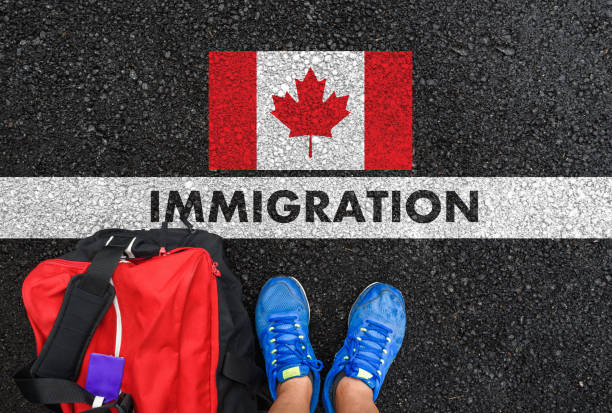Canada is known for welcoming immigrants and has become a good choice for people looking for a fresh start. As you know, the Canadian government anticipates a staggering 1.2 million immigrants by 2024, and now’s a great time to pin your name on that list.
With the many easiest ways to immigrate to Canada as a foreigner, you have nothing to worry about! Canada has several economic immigration programs at the Federal and Provincial levels designed to attract skilled workers and tradespeople from across the globe.
In addition to the economic programs, there are pathways for foreigners to immigrate to Canada for studies or to reunite with family members. The Canadian immigration process is not easy for everyone.
One must undergo numerous procedures, which might take months or even years. The good news is that you can increase your chances of success and get inside Canada without waiting long.
However, you must know the best immigration options to avoid delays and frustrations. Keep reading to understand some of the easiest ways to immigrate to Canada as a foreigner.

Requirements to Immigrate to Canada as a Foreigner
Each Canadian immigration program has unique eligibility criteria. Ensure you meet the eligibility requirements for the specific program of interest before applying. The general requirements may include:
- Applicants must be 18 or older for economic immigration programs. Those between the ages of 25 and 35 receive the highest points.
- Proficiency in English or French, depending on your preferred settlement region
- Minimum of senior secondary education
- Minimum of one year of relevant work experience (for economic programs). Specific programs may require more.
- Meet the minimum points requirement on the C.R.S.
- Settlement funds of at least $13,750 for a single applicant in the Express Entry Program.
- Clean criminal record.
- Connections to Canada.
Immigration Pathways to Canada as a Foreigner
1. Express Entry
The Express Entry system allows the Canadian government to manage applications for specific immigration programs.
These programs include the Federal Skilled Worker Program, Federal Skilled Trades Program, and Canadian Experience Class.
To be eligible for Express Entry, you must first create an online profile and be accepted into the pool of candidates. You will then be ranked based on your work experience, education, language skills, etc.
If you are ranked highly, you may receive an Invitation to Apply (I.T.A.) for permanent residency.
2. Provincial Nominee Programs
Each province in Canada has its immigration program designed to help immigrants settle in a specific region. These programs allow provinces to nominate individuals who meet the particular needs of the province’s labor market.
To be eligible for a Provincial Nominee Program, you must have the skills, education, and work experience needed to contribute to the province’s economy.
You must also meet the program’s specific requirements, which can vary from province to province.
3. Family Sponsorship
If you have a spouse, common-law partner, child, parent, or grandparent who is a Canadian citizen or permanent resident, they may be able to sponsor you to come to Canada.
The sponsor must demonstrate that they have the financial means to support you and ensure you do not need government assistance.

4. Study Permit
If you are accepted to a Canadian school, you may qualify for a study permit, which allows you to live and study in Canada for the duration of your program.
You must have a letter of acceptance from a recognized educational institution, proof of sufficient funds to cover your tuition and living expenses and a clean criminal record.
After completing your studies, you may be able to apply for a work permit and, eventually, permanent residency.
5. Work Permits
If you have a job offer from a Canadian employer, you will qualify for a work permit to live and work in Canada for a specific period.
To obtain a work permit, you need to present your job offer letter from a Canadian employer and meet the particular requirements of the job.
In addition, you must be able to demonstrate that you will leave Canada at the end of your work permit. This can be a stepping stone to permanent residency.
6. Start-up Visa
The Start-up Visa Program is designed for entrepreneurs who want to start a business in Canada. You must have a business idea that a designated organization has accepted and receive a letter of support from that organization.
You must also meet the program’s requirements, which include demonstrating that you have sufficient financial resources to support yourself and your business and complete a medical examination.
7. Self-Employed Person Program
If you are self-employed and demonstrate experience and skills in Canada, you may be eligible to immigrate through this program.
To qualify for the Self-Employed Persons Program, you must have relevant experience in cultural or athletic activities or farm management.
You must also have the financial resources to cover expenses and establish your business in Canada.
8. Atlantic Immigration Pilot
The Atlantic Immigration Pilot is a program designed to help immigrants settle in the Atlantic provinces of Newfoundland and Labrador, New Brunswick, Nova Scotia, and Prince Edward Island.
To be eligible for the Atlantic Immigration Pilot position, you must have an approved job offer.
9. Rural and Northern Immigration Pilot
The Rural and Northern Immigration Pilot program is designed to help immigrants settle in smaller communities in British Columbia, Manitoba, Ontario, and Saskatchewan.
Suppose you want to qualify for the Rural and Northern Immigration Pilot. In that case, you must have a job offer from a designated employer in a participating community and meet the program’s specific requirements.
You must also have the skills and education needed to successfully integrate into the labor market and community in the participating community.
10. Humanitarian and Compassionate Consideration
If you are not eligible for any other immigration program, you should consider applying for permanent residency on humanitarian and compassionate grounds. This is a discretionary process, and each case is considered on merit.
To be considered for humanitarian and compassionate consideration, you must demonstrate that you would face unusual, undeserved, or disproportionate hardship if required to leave Canada.
11. The Intra-Company Transferee (I.C.T.)
A program that allows companies to temporarily transfer employees from their international operations to their Canadian operations.
The employee must have been working for the company for at least one year and must be coming to Canada to work in a managerial, executive, or specialized knowledge position.
The employee must also be paid a salary comparable to what they would earn in Canada for a similar position.

Is There a Maximum Age for Immigrating to Canada?
None of the immigration programs introduced by the government of Canada have a minimum or a maximum age for application.
However, in the immigration pathways related to economic migration, an applicant can receive a maximum of 25 to 30 points for their age.
Although older applicants will receive lower points for their age, they can certainly compensate for the same with more work experience. They can boost their points tally through:
- high scores in language proficiency tests
- present connections to close family members already residing in Canada as citizens or P.R.
- Higher scores for their higher education
- Last but not least, a job offer from a Canadian employer
Moreover, if you are applying to immigrate to Canada on humanitarian grounds, as a refugee, or with family sponsorship, you do not need to go through the ranking system. Hence, age is never an issue in such cases.
How Much Money Do You Need to Immigrate to Canada?
You need at least $13,700 to settle in Canada. This is the average amount covering a single person, but the cost increases if you move with other family members.
It would help if you also accounted for other unexpected expenses that may come up during the moving process, such as entry taxes, shipping costs for your items, and document legalization, among others.
Conclusion
The easiest way to immigrate to Canada depends on your circumstances and qualifications. It is always a good idea to check the I.R.C.C. website to help you understand the requirements for each program and guide you through the application process.
Moving to a new country can be an exciting but also overwhelming experience. Therefore, you must do your research and prepare as much as possible before making the move.
This can help ensure a smooth transition and make adapting to your new life in Canada easier. Good luck with your immigration journey!
Frequently Asked Questions
Which Province Is The Easiest To Immigrate To Canada?
Saskatchewan, Alberta, Ontario, and Nova Scotia are some of the easiest provinces to immigrate to Canada.
What Is The Less Expensive Way To Migrate To Canada?
The cheapest way to immigrate to Canada would probably be through applying directly to a Provincial Nominee Program.
Is It Possible To Apply For Express Entry And PNP At The Same Time?
Absolutely. Yes, you can apply to both at the same time. But you must first apply to Express Entry and meet the 67-point criteria.
What Is The Minimum Score For Express Entry?
For the Express Entry, you need a score of at least 67 points. This is the passing mark on the Federal Skilled Worker grid.
